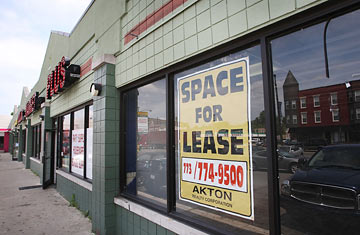
A sign advertises space for lease at a strip mall in Chicago
The commercial real estate market seems headed for trouble, the next potential victim of the speculative frenzy that has already devastated the residential housing market. That prospect apparently hasn't scared investors. Shares of real estate investment trusts (REITs, which buy and manage buildings and mortgages) have been on a tear for the past seven months, almost doubling in value on average. REITs now trade at a double-digit premium to the value of their underlying properties.
The buying binge comes as commercial real estate rents and occupancy rates continue to plunge, leaving industry experts wondering if the rally was premature at best — and overdone at worst. "I'm a little bit more cautious in the near-term, given the rally that we've had and where valuations sit," says Michael Bilerman, a Citigroup Global Markets analyst. "They're trading at a 15% to 20% premium to NAV [net asset value]." He says he wouldn't be surprised if REIT stocks saw a 5% to 10% correction in the near-term.
The recent Chapter 11 bankruptcy filing of commercial real estate lender Capmark Financial Group appears to validate the doom-and-gloom scenario for commercial real estate fundamentals.
"While the U.S. economy is emerging from recession, we still anticipate a prolonged period of declining growth for REITs and commercial real estate," said Goldman Sachs analyst Jonathan Habermann in an October research note. Habermann doesn't expect to see a significant improvement in real estate rents, occupancies and property values until late 2012 at the earliest. Joseph Betlej, vice president of Advantus Capital Management and portfolio manager of the Ivy Real Estate Securities fund, believes it could be late 2012 or even 2013 before office REIT fundamentals bounce back.
Historically, real estate lags behind an economic recovery. In the 1991 recession, it took the industry 14 months to rebound after the recession's end, and in the 2001 downturn, it took 29 months for the sector to recover, says Bob Bach, chief economist with Grubb & Ellis Co., a commercial real estate services and investment company. Even if the current recession ended in the second quarter, it could take anywhere from 14 to 29 months for real estate to bounce back, says Bach. Unemployment, which is expected to hit 10.5% in 2010, exacerbates the situation, he says. All of this will likely lead to higher default rates on commercial property loans and distressed property sales.
So did investors overreact when they jumped into the sector last March and drove REIT prices up 97% from that trough? Not exactly. REIT valuations were extremely cheap, as the sector had lost 73% of its value from its peak in February 2007. "REITs were priced in the first quarter like they were going bankrupt," says Robert W. Baird & Co. director David AuBuchon.
Funny he should mention that word. There is currently $3.5 trillion in outstanding commercial real estate debt, with much of it related to properties purchased at exorbitant prices during the real estate boom that ended in 2007. Many private equity players and hedge funds used heavy leverage — borrowing up to 80% of the purchase price — to acquire the properties and are now struggling to generate the cash flow needed to service the debt and meet debt calls. Bach estimates that about $500 billion in commercial real estate debt will come due each year for the next few years.
There will be casualties. But REITs with access to capital could potentially pick up properties and mortgage assets at fire-sale prices. "[Well-capitalized REITs] are going to be the most competitive out there with their access to [low-cost] capital," says Tom Bohjalian, senior vice president and portfolio manager at Cohen & Steers.
All of this triggered a flurry of dedicated mutual funds, value managers, ETFs and hedge funds to move into the sector in a big way, notes Bilerman. Although the FTSE NAREIT All REIT Index surged 97.6% from the group's trough on March 6, it's still off 50% from its peak in February 2007, according to the NAREIT. So investors are willing to pay up for REITs based on their longer-term outlooks and potential windfall in the distressed real estate market, says Bohjalian. REITs touted as likely buyers in the distressed market are Simon Property Group, Vornado Realty Trust, Boston Properties and Host Hotels & Resorts.
The vultures are circling, waiting for commercial real estate corpses.
